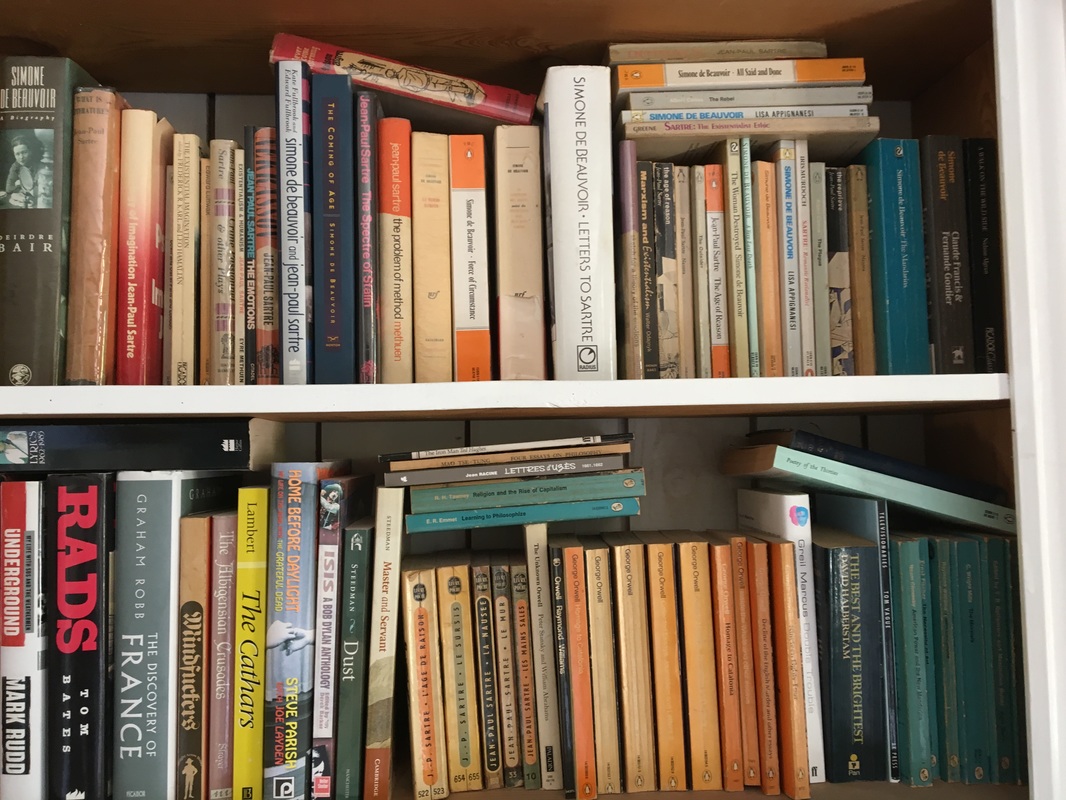We’re both right. And Jill is certainly right when she asserts for the umpteenth time that we have too many books, that 99% will never be read again or even taken down from the shelves, and that they are merely dust-gatherers.
So I am, reluctantly, embarking on a cull. The shelves in England and France are being emptied. It is a gradual and time-consuming process, because a couple of pages of each of the couple of thousand books need to be at least scanned before being dispatched to friends, charity shops and in some cases such as the old green-backed Penguin detective novels which are falling apart – the tip or déchetterie.
It is, of course, true that, as Bagshaw famously remarks through the pen of Anthony Powell, “books do furnish a room”. But mine offer me more than this.
To read my ownership signature dated sometime in the early ‘60s in an old paperback is to bring back a flood of memories. In this sense, a book can be as evocative as a Dylan album. It locates me precisely in a time and a place and with an attitude which I remember with affection and nostalgia, guilt and embarrassment.
In 1964, for example, I seem to have acquired A Moveable Feast by Ernest Hemingway, One Dimensional Man by Herbert Marcuse, Nova Express by William Burroughs, CP Snow’s Strangers and Brothers sequence, The Italian Girl by Iris Murdoch, Ernst Fischer’s The Necessity of Art and a plethora of thrillers by the likes of Ian Fleming, Rex Stout and Len Deighton.
Sounds to me like a fifteen year old trying to find his way. It was.
From my shelves, I can also date my discovery of particular author: Patrick O’Brian, for example. His work starts in paperback, and ends in hardback as new novels in the sequence were released.
And here I can see that moment when I discovered the joy of owning a first edition of a particular novel – I have relished a copy of Simon Raven’s first published novel, The Feathers of Death, with a hand-written dedication by Raven to EM Forster on the fly-leaf, and a first US edition of Advertisements for Myself, with Norman Mailer’s own suggestions in pencil for changes to the first UK edition (which I also have).
At about the same time, I got into the habit of buying two copies of some ‘literary fiction’- Paul Auster, McEwan, DeLillo, William Boyd et al: one to read, and thus to risk a broken spine and damaged dust-jacket; and one to … well, just put on the shelves for posterity. And yes, okay, to gather dust.
But many of these first editions appear to have a market still, so I can justify those purchases on the grounds that they were investments. My book-dealer friends will be benefitting from them in due course.
As, I hope, will I. I’m going to need the cash to download these works onto my Kindle. For re-reading one day, you understand. Nothing to do with completism.
Next stop? Vinyl, CDs and some paintings. Watch this ever-growing space on shelves and walls.
Today from the everysmith vaults: Railroad Earth revisited, with special emphasis on shows from the mid-nineties.






 RSS Feed
RSS Feed